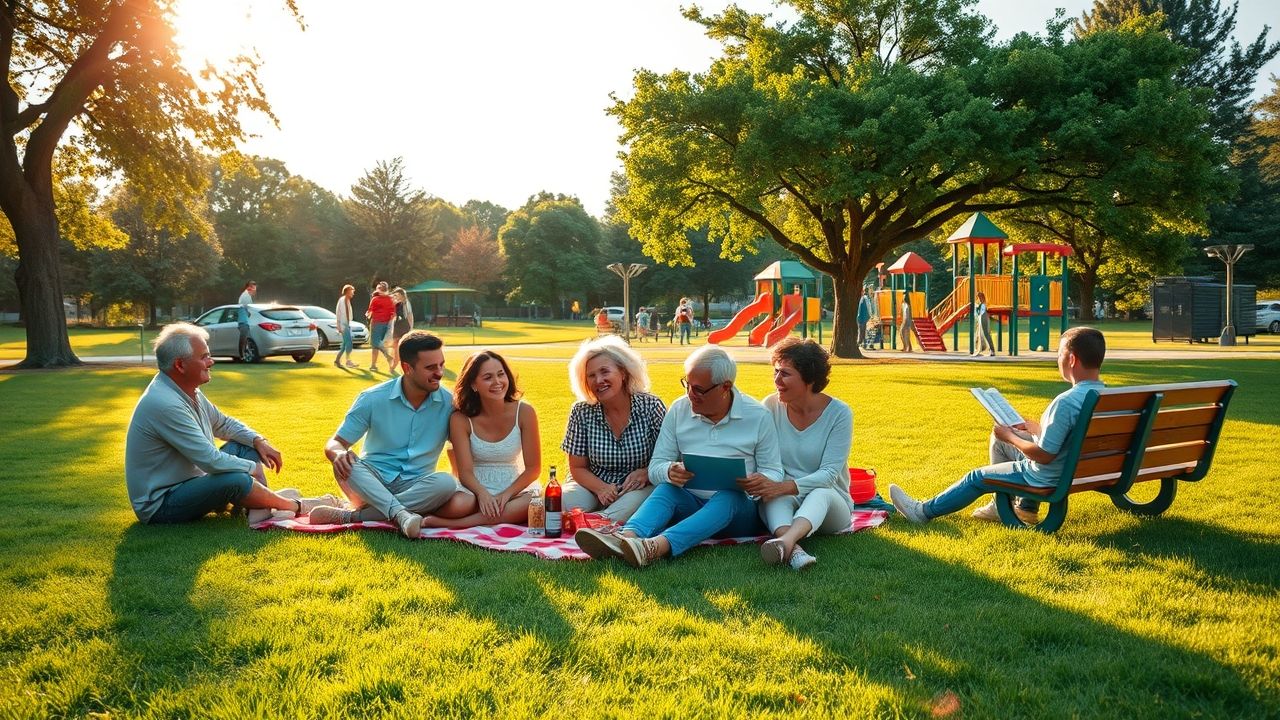The Weekend Unpacked: Local Insights on Rest, Play, and Community
There’s a universal sigh of relief that sweeps through our community every Friday afternoon. The workweek gears down, school bells ring for the last time, and a palpable sense of anticipation fills the air. This feeling, this collective yearning, is all about the weekend – a precious window of time dedicated to rest, recreation, and reconnecting. It’s more than just two days off; it’s a cultural cornerstone, a necessary rhythm in our busy lives, and a period ripe for personal growth and communal bonding.
Key Summary:
- The weekend is vital for mental and physical well-being.
- Its cultural significance has evolved, moving from pure necessity to a lifestyle choice.
- Local insights reveal how communities are adapting weekend traditions in the digital age.
- Strategic planning and conscious unplugging can maximize weekend benefits.
- Misconceptions about ‘weekend productivity’ often undermine true rest.
Why The Weekend Matters More Than Ever
In our increasingly demanding world, the boundaries between work and personal life often blur. Emails ping late into the evening, and the pressure to be ‘always on’ can be relentless. This makes the sanctity of the weekend not just a luxury, but a critical component of our collective health and societal resilience. Without these periods of decompression, burnout becomes rampant, creativity wanes, and our ability to engage meaningfully with our families and communities diminishes. Economically, the weekend also fuels entire sectors – from hospitality and tourism to entertainment and local retail – contributing significantly to the vibrancy of our towns and cities. Beyond the economic ripple effect, the weekend acts as a vital reset button for individuals. It’s during these precious hours that we can truly disengage from the pressures of work and school, allowing our brains to defragment and our bodies to recuperate. The absence of this dedicated downtime would lead to chronic stress, diminished creativity, and a general decline in public health and happiness.
For individuals, the benefits are profound. A well-spent weekend can reduce stress, improve sleep, boost mood, and even enhance cognitive function. It provides the canvas upon which memories are painted, hobbies are pursued, and personal batteries are recharged. It’s where we get to be more than just our professional roles; it’s where we reclaim our identities as partners, parents, friends, and community members. The quality of our weekends often dictates the quality of our weeks, making this two-day interlude far more impactful than its brevity suggests.
The Evolution of Weekend Culture: From Necessity to Lifestyle
The concept of the weekend as we know it is a relatively modern invention, born out of industrial labor movements advocating for better working conditions and a clearer demarcation between work and rest. Historically, days of rest were often tied to religious observance, like the Sabbath. However, the secular, two-day break became standardized in the early 20th century, particularly with Henry Ford’s adoption of the five-day workweek in 1926, recognizing its benefits for worker productivity and morale.
From Toil to Leisure: A Brief History
Initially, this shift was revolutionary. It provided laborers with unprecedented freedom and time, leading to the rise of new industries catering to leisure activities. People began to travel for pleasure, attend sporting events, and engage in social gatherings on a scale previously unimaginable. This period saw the blossoming of parks, cinemas, and holiday resorts, all designed to accommodate this newfound collective downtime. The weekend became synonymous with freedom, escape, and personal pursuit, fundamentally reshaping how individuals spent their non-working hours and influencing urban planning and economic development.
The Modern Weekend: A Balancing Act
Fast forward to today, and while the structure remains, the pressures surrounding it have changed. We are blessed with an abundance of choices – from global travel to digital entertainment – but also burdened by the constant pull of connectivity. The digital age, with its ubiquitous smartphones and always-on work culture, presents a paradox: we have more ways than ever to fill our leisure time, yet we often struggle to genuinely unplug. This tension makes the intentional cultivation of a meaningful weekend even more crucial. We are called to be more deliberate about how we spend our precious downtime, to resist the urge to fill every moment with external stimulation, and instead, seek out activities that truly rejuvenate and connect us to what matters most. Yet, its core purpose remains: to offer a pause, a moment for personal renewal before the next cycle begins.
Local Perspectives: Crafting the Perfect Weekend
Reporting from the heart of the community, I’ve seen firsthand how diverse and vibrant our local weekend culture truly is. From the bustling farmers’ market on Saturday mornings to the quiet trails where families hike on Sunday afternoons, our community leverages these two days to foster connection and well-being. It’s not just about what you do, but how you do it – with intention and presence. I’ve spoken with countless residents who prioritize unplugging, seeking out local experiences, and spending quality time with loved ones over constant digital engagement.
In my 15 years observing local trends, I’ve found that the most fulfilling weekends often involve a blend of activity and genuine rest. There’s a growing movement towards supporting local businesses – whether it’s a coffee shop for a leisurely Saturday morning or a family-owned restaurant for dinner. This not only enriches the weekend experience but also strengthens the community fabric. I’ve seen neighbors organize impromptu block parties, local artists host open studios, and volunteer groups dedicate their time to community gardens. These are the moments that truly define our weekends here. Furthermore, I’ve observed a growing emphasis on outdoor activities, especially with our community’s access to nature trails and local parks. Families are increasingly opting for screen-free adventures, whether it’s a leisurely bike ride along the river or a challenging hike up the nearby hills. This engagement with nature provides not only physical exercise but also a profound sense of calm and perspective, a vital antidote to the stresses of the week.
One local resident, Sarah Chen, shared her family’s ritual:
“Every Saturday, we have a ‘no screens before noon’ rule. We use that time for a big family breakfast, board games, or working in the garden. It sets a really different tone for the whole weekend. It’s about being present, not just passing time.”
This kind of intentionality is what truly transforms `the weekend` from just time off into meaningful living. It’s about creating rituals that nourish the soul and strengthen bonds.
The Digital Dilemma: Reclaiming Your Weekend from Screens
While technology offers incredible convenience and entertainment, it also poses a significant threat to the restorative power of the weekend. The constant notifications, the urge to check work emails, and the endless scroll of social media can erode the very essence of downtime. Many find themselves feeling just as drained on Monday morning as they did on Friday, having spent their weekend passively consuming digital content rather than actively engaging with their lives. The allure of instant gratification and endless entertainment can subtly undermine our capacity for genuine rest and reflection, leaving us feeling overstimulated rather than rejuvenated.
Reclaiming your weekend often begins with setting boundaries for digital devices. Consider designated “tech-free” hours or even entire days where smartphones are put away. Instead, fill these hours with activities that engage your senses and mind in different ways: reading a physical book, spending time outdoors, pursuing a creative hobby, or simply enjoying uninterrupted conversation with friends and family. The goal isn’t to demonize technology, but to use it mindfully, ensuring it serves your well-being rather than detracting from it. This conscious effort to disconnect allows for deeper engagement with the real world and fosters more meaningful connections.
Common Misconceptions About Weekend Productivity
One pervasive misconception is that `the weekend` must be used for maximum productivity – catching up on chores, running errands, or tackling projects that fell by the wayside during the week. While some practical tasks are inevitable and can contribute to a sense of order, a rigid adherence to this mindset can rob you of essential rest and leisure. The idea that every minute must be optimized often leads to a feeling of failure if nothing “significant” is accomplished, negating the true purpose of downtime and fostering unnecessary stress.
Another myth is that true relaxation means doing absolutely nothing. While periods of idleness are crucial for mental and physical recovery, a healthy weekend often involves a mix of active pursuits and quiet reflection. It’s about choosing activities that genuinely recharge you, whether that’s an invigorating hike, a challenging puzzle, a creative project, or a simple, leisurely meal with loved ones. The key is balance and self-compassion, recognizing that rest itself is a form of productivity, preparing you to tackle the week ahead with renewed energy and focus. Don’t confuse busyness with fulfillment; sometimes, the most productive thing you can do is simply to rest.
In conclusion, `the weekend` is a precious resource, a time to step away from the daily grind and reinvest in ourselves, our relationships, and our communities. By embracing intentionality, limiting digital distractions, and understanding that true rest is a vital component of well-being, we can transform these two days into a powerful force for personal and collective flourishing. Let’s make every weekend count, not by filling every minute, but by filling it with what truly matters.
Frequently Asked Questions
What are the benefits of a well-planned weekend?
A well-planned weekend reduces stress, improves mental clarity, boosts mood, and provides crucial time for personal hobbies and social connections, leading to greater overall well-being and preparedness for the week ahead.
How can I disconnect from work during the weekend?
Set clear boundaries by turning off work notifications, avoiding checking emails, and designating tech-free times or activities to truly separate yourself from professional demands and encourage mental disengagement.
What are some budget-friendly weekend activities?
Explore local parks, public libraries, free community events, hiking trails, host a potluck with friends, or enjoy a picnic. Many communities offer free cultural or recreational programs that are both enriching and economical.
Is it okay to do nothing during the weekend?
Absolutely. Doing “nothing” (i.e., unstructured rest and relaxation) is essential for preventing burnout and allowing your mind and body to fully recover from the week’s demands. True rest is a form of active recovery and is highly productive.
How has the concept of the weekend changed over time?
Originally a religious observance, the secular two-day weekend became widespread in the 20th century due to labor movements advocating for worker rights. Today, it faces challenges from digital connectivity but remains a vital period for personal and societal well-being and rejuvenation.


